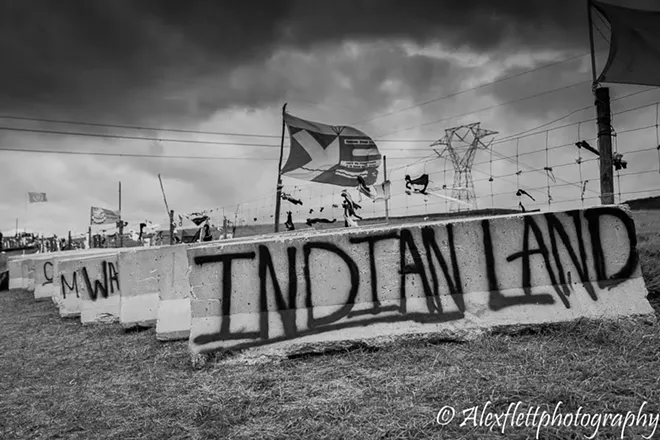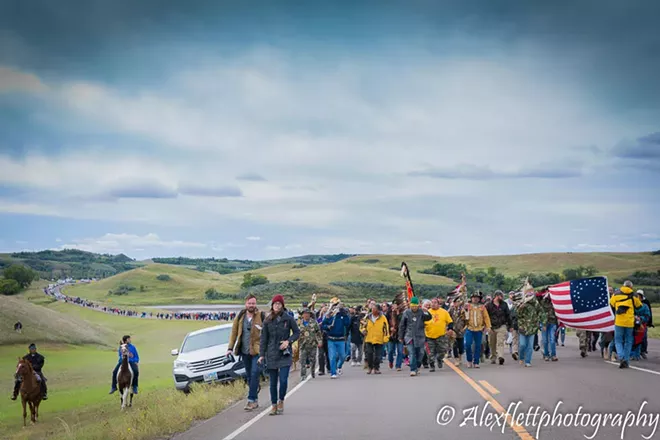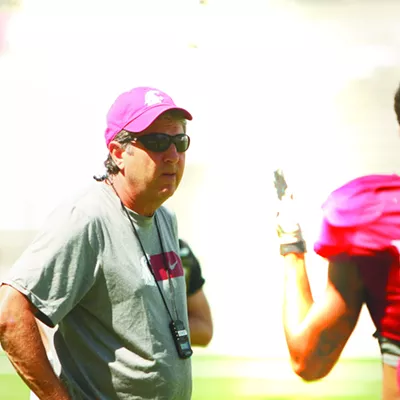Saturday, September 17, 2016
What one member of the Spokane Tribe saw at the ND pipeline protest
Since this August, hundreds of Native American tribal members and environmentalists have been protesting the construction of the Dakota Access Pipeline, an oil pipeline that could carry half a million barrels of crude oil from North Dakota to Illinois each day.
The project is near the reservation of the Standing Rock Sioux. The tribe says that pipeline would desecrate its ancestral homelands that include gravesites. They also say that a breach in the pipeline would be environmentally catastrophic and would jeopardize its drinking water.
Last week, a judge ruled that the project can proceed. But the Obama administration intervened, effectively pausing work on key portions of it. For many supporters of the Standing Rock Sioux, the pipeline’s construction is about tribal sovereignty and environmental protection.
David BrownEagle, vice chair of the Spokane Tribal Business Council, made the trip to North Dakota along with photographer Alex Flett, who shared some photos with us. BrownEagle spoke to the Inlander about what he saw there. His remarks have been edited for clarity and brevity.
Inlander: What did you see there?
David BrownEagle: I saw beauty, power and communities coming together.
What was beautiful and powerful?
All the people coming together: different races, backgrounds. The young people stepping up. The young people leading the rally at the state capitol on Friday and Saturday.
Were you protesting the whole time?
I don’t know if “protest” is the right word. There was also a number of canoes from an Alaskan tribe. People came down with canoes. The Kalispel, the Coeur d’Alene, the Colville and other tribes from the coast, they came over because it was the protection of water so they paddled down the Missouri River.
There were a number of tribal flags and some bands from Canada. The roadway into the camp had flags all around. It was beautiful.
If it wasn’t a protest, how would you describe it?
I would say it’s an awareness that our planet is suffering. It was like all the awareness in the United States came to a head with the Standing Rock Sioux. I think we as a people in this country and all people are realizing that our resources are limited and we are finally figuring that out. And the awareness in North Dakota is really bringing that to the forefront finally. It’s been going on for years but it came to the forefront.
I was at Seattle City Council and I spoke up there and they brought a resolution there and it was unanimous.
Does the situation in North Dakota speak to any issues here?
Well, one is the crude oil and the shipment of oil through our community and how it might get into the water.
I remember Spokane River was pretty polluted years ago. It’s getting better.
It sounds really positive, but wasn’t there violence?
Part of that violence — my understanding is, I was reading one of the newspapers — is that the security they hired they were looking into if they were even licensed.
That was the violent part the protestors were very, very peaceful. It was really nice when the protesters went by the highway patrol and they shook their hands.
Is there anything about the situation there that is of particular significance for the Spokane Tribe?
You know about the uranium mine and the impact it had on our river? That’s having an impact and the radioactive material we’re finally getting cleaned up, but it will be years and years.
What are you hoping will happen?
What I hope will happen is more and more people will become aware of the impact we're having on our water, our air and on our ground.
I think there’s an awareness growing that it is going to have an effect on the future. Maybe not on you, but our children and our grandchildren, they will suffer more than we do.
Tags: North Dakota Access Pipeline , Spokane Tribe , David BrownEagle , Alex Flett , News , Image , Video





















